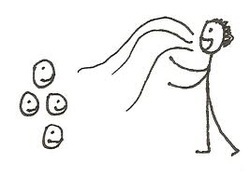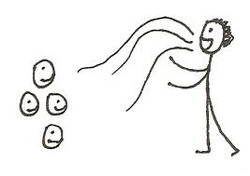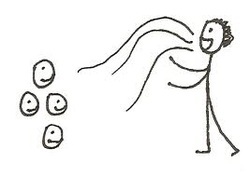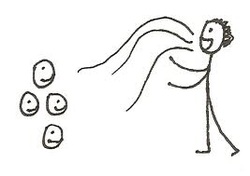 My late rebbe, R' Zalman Schacter-Shalomi, zt"l, (זכר צדיק לברכה) was a master storyteller. He taught: "a good story is one where the mind surprises the heart". "A Year of Stories" is dedicated to his memory. I invite you to forward the link to these stories so that they find their way into the hearts of other tellers and listeners. ^^^^^^^^^^^^^^^^^^^^^^^^^^^^^^^^^^^^^ In her book, The December Project, writer Sara Davidson shared this from one of her many meetings with Reb Zalman: He quoted Woody Allen, who said, “I don’t mind dying, I just don’t want to be there when it happens.” But Reb Zalman said “I do want to be there. It’s such a holy moment… I want to watch the last breath going out and whisper the Shema. I want to merge back with the infinite… like a drop in the greater ocean.” With that intention in mind - this week's story. (No story next week kiddies, we'll bedriving our daughter Kaziah to her fresh(wo)man adventure at Mt. Holyoke) ************************************ Once upon a time there was a little wave. The wave loved being a wave, bobbing along in the ocean, up and down, all day and all night. He enjoyed the wind and the fresh air, surrounded by lots of other waves, who he enjoyed watching and playing with. Then one day, the little wave noticed that something seemed to be happening to the waves in front of it. It noticed that it, along with all the other waves, was coming up to something big… the end of the ocean. The little wave saw a wave in front of it going up, higher and higher. That wave was filled with light and it was as high as it could possibly go (which was the best part of being a wave)… and then it came crashing down and smashed into bits. My God, this is terrible”, the wave said, “look what’s going to happen to me.” The little wave saw another wave in front of it do the same thing… going way up high and then come crashing down. The little wave saw this and became very afraid. A voice called out to him from amidst the sea, “Why do you look so sad?” The little wave answered, “Don’t you get it? We’re all going to crash! All of us waves are going to be nothing! Isn’t it terrible?” The voice remained calm, saying, “No, you don’t understand. You’re not only a little wave, you’re part of the ocean. You’re not only a little wave, you’re part of the ocean.” And in that moment, the little wave trickled onto the beach, and then turning, rolled back into the ocean. (I shaped this version of the story from a version that I have together with the short version that appears in Mitch Albom's Tuesdays with Morrie, Pg. 179) ******************* If you would like to be added to the growing list of "Year of Stories" followers, let me know at [email protected], with "Year of Stories" in the subject line. *************** A personal note: When a storyteller follows up a story by telling the listener what it means, my heart sinks and my mind withdraws. I leave it to you, gentle reader, to place these stories into the context of your personal journey, gleaning whatever meaning or interpretation resonates within.
0 Comments
 My late rebbe, R' Zalman Schacter-Shalomi, zt"l, (זכר צדיק לברכה) was a master storyteller. He taught: "a good story is one where the mind surprises the heart". "A Year of Stories" is dedicated to his memory. I invite you to forward the link to these stories so that they find their way into the hearts of other tellers and listeners. Tu b'Av was on Monday, and inspired me to post a love story - this time one for you to listen to. It is told by me and my b'shert, Renée Brachfeld, on our CD King Solomon's Daughter. I can tell you excactly where we heard it for the first time - under the chuppah at our wedding in 1993. It was translated from Sefer Tanchuma by Rabbi Jack Moline, and he spun the tale while inviting all of our family and friends to sing Od Yishama, which he wove throughout the story. So sit back for the next 11 minutes and enjoy this sweet tale of a love that was meant to be.. A variant written version of the story can be found here. Next week we'll return to a written story, but stay tuned for more stories in audio form. ***************
If you would like to be added to the growing list of "Year of Stories" followers, let me know at [email protected], with "Year of Stories" in the subject line. *************** A personal note: When a storyteller follows up a story by telling the listener what it means, my heart sinks and my mind withdraws. I leave it to you, gentle reader, to place these stories into the context of your personal journey, gleaning whatever meaning or interpretation resonates within.
One day the Baal Shem Tov sits at his table with his people. The weather is getting cold, but he says, "Get the wagon together, and make sure you bring some lekach and some bronfen (cake and spirits), and come with me." So they get into the wagon, and after a time they come to an inn. The Baal Shem says to the innkeeper, "Can you prepare for a wedding?"
And the innkeeper says, "Yes, of course. How many people?" "Not too many people, "the Baal Shem replied, "but we'll need a nice meal." "No problem," the innkeeper says, "I'll send over to another fellow who has a roadhouse a little further on, so he and his wife can come and help. I'm a little short-staffed right now," he explains. "I usually have a young woman and a young man here to help me, but they're off today, the two of them." "Where did they go?" the Baal Shem says. "Well, they're about to get married, and today they went to the town to buy what they need for their new home together. They've been saving up for years." "Very good," the Baal Shem says, "All right, start preparing." Meanwhile, the young couple are on their way to town. No sooner do they get to the market when they see a family being dragged through the streets in chains. The town crier shouts in front of them, "These people haven't paid their rent to the landlord! They are going to be put into the darkest jail until they rot there and die!" The couple are appalled. "How much do they owe?" they ask the town crier. "Three hundred rubles," he says. Three hunderd rubles! It is all they have. But he looks at her and she looks at him, and yes, they take off their money belts and give everything they have to redeem the family. Before the family have even recovered enough to thank them, the couple are gone. On their way back they agree: "We can't tell the people that we gave away all our hard-earned money: they'll call us fools! Let's rough each other up a little, and when we get back we'll say that robbers fell on us and took our money." So they came back bruised and empty-handed to find the inn in an uproar, preparing for a wedding as the Baal Shem had requested. The innkeeper rushes up and says, "Good, you're here! Quick, I need help setting up - oy, vey, what happened to you? Where's the furniture?" And they tell him the whole tale of woe. At this, the Baal Shem calls them both aside and says, "It's your wedding that we're preparing for, and I am here to marry you myself." And so they were married. Now it was the custom that the guests at a wedding would say a droshe geshank, a little speech announcing the present that each guest is giving to the couple. "I give a pair of handsome brass candlesticks," one of the innkeepers says. "I'm going to give a baking trough," says another. At some point they return to the Baal Shem. "What about you, Rabbi?" And the Baal Shem says, "To the groom I give the estate of Count Potptzki. To the bride, I give Countess Potozki's jewelry." All the guests laugh uproariously and they continue with their meal and the seven traditional blessings. Suddenly before dessert is on the table, the Baal Shem says to the couple, "You must leave now, right away. Get on your wagon and horse and go." "Where should we go?" "Into the forest. Go." In the meantine a snowstorm has started, a blizzard. The couple are in the midde of the forest and lose their way. All of a sudden, the horse rears up and refuses to go a step farther, When they peer ahead to see what the problem is, they see the body of a young boy lying in the snow. They dismount quickly and pick him up. He's still alive, and they rub him all over and give him some schnapps and the lekach that the Baal Shem Tov gave them for the way. "Who are you?" they ask the boy. "Where are your parents?" "I am the son of the Count and Countess Potozki," the boy tells the. I received a new horse for my birthday, but the horse threw me off and I don't remember anything after that." And he points them to the castle of the Count. Meanwhile the Count and and his wife are beside themselves with worry. The horse they'd bought for their son had returned without its rider. The Count's followers had been unable to find the boy in the worsening storm, and the weather was getting so bad that they were afraid to continue. Finally, in desperation, the count said, "I pledge my entire estate to the person who brings back my son." "And I pledge my jewelry as well!" says the countess. Just then the couple arrives with the boy on their horse. And that's how the Baal Shem's drosha geshank to that couple, who had given all their money away to redeem a captive family, came to pass. * * * * * * * * * * * * * In the book, Reb Zalman tells us that this is an example of a good story for a melaveh malka, a post-Shabbas Saturday night gathering. Why? Because he explains that "embedded in these tales was the message that any one of us, with no warning or preparation, may be presented with the opportunity to serve as the Holy One's instrument to improve the world - if we rise to the occasion. This vision, this mystic ideal, this high ambition, is what we take forward with us into the week" (Jewish With Feeling Pg. 74) * * * * * * * * * * * * * If you would like to be added to the growing list of "Year of Stories" followers, let me know at [email protected], with "Year of Stories" in the subject line. * * * * * * * * * * * * * A personal note: When a storyteller follows up a story by telling the listener what it means, my heart sinks and my mind withdraws. In this case however, I could not resist. It's a machaya to have been given the sod (secret) from Reb Zalman. * * * * * * * * * * * * * Question: Is the horse the same horse as in story #3? :>) The Optimist and The Pessimist  My late rebbe, R' Zalman Schacter-Shalomi, zt"l, (זכר צדיק לברכה) was a master storyteller. He taught: "a good story is one where the mind surprises the heart". "A Year of Stories" is dedicated to his memory. I invite you to forward the link to these stories so that they find their way into the hearts of other tellers and listeners. ∞ ∞ ∞ ∞ ∞ ∞ ∞ ∞ ∞ ∞ ∞ ∞ ∞ ∞ ∞ ∞ ∞ ∞ ∞ ∞ ∞ ∞ There once lived a king who had twin sons. Though they looked exactly alike, their personalities were different as night and day. One was a devout pessimist, the other an incurable optimist. When they came of age, the king decided it was time to open their eyes to the other side of life, and he planned to do so through the gift that he would give to each of them. For the pessimist, he went to the royal jeweler. "I would like him to have the finest watch ever made", he said. "Money is no object - jewels, diamonds, gold, platinum- the best. And I want it ready by his birthday." For the optimist, he went to the Palace Gardener. "When he wakes up on the morning of his birthday, I want him to see, at the foot of his bed, a huge pile of manure." The birthday arrived, and the king, with great anticipation, went to see his pessimistic son. He found him sitting glumly on his bed, holding a magnificent watch. "How do you like your gift?" asked the king. "It's all right," said the pessimist. "But it's really rather gaudy. And even if it wasn't, it's the sort of thing that will probably get stolen, or I might break it or worse, I might lose it." The king had heard enough and went off to visit the room of the sunny optimist. As he approached he heard singing and laughter teeming from the room, and when he entered, he found his son dancing with joy. When his father entered the room, the son ran up and hugged him. "Oh, thank you, father, thank you! It's just what I wanted!" Bewildered, the king asked his son, "Just what are you thanking me for?" "Why father", the son cried out with glee, "for the horse!" (Retold by R' Mark Novak - origin unknown - please let me kmow if you have a source) ******************* If you would like to be added to the growing list of "Year of Stories" followers, let me know at [email protected], with "Year of Stories" in the subject line. ******************* A personal note: When a storyteller follows up a story by telling the listener what it means, my heart sinks and my mind withdraws. I leave it to you, gentle reader, to place these stories into the context of your personal journey, gleaning whatever meaning or interpretation resonates within. |
Mark Novak is a "free-range" rabbi who lives in Washington DC and works, well, just about everywhere. In 2012 he founded Minyan Oneg Shabbat, home to MOSH (Minyan Oneg Shabbat), MindfulMOSH (Jewish mindfulness gathering), and Archives
June 2017
Categories
All
|

 RSS Feed
RSS Feed
